Several herbal teas can boost your immunity against the flu. Echinacea tea stimulates white blood cell production, while ginger tea offers antiviral properties. Elderberry tea prevents viruses from entering cells, and green tea contains powerful antioxidants. Licorice root tea soothes sore throats and reduces inflammation, while peppermint tea acts as a natural decongestant. Turmeric tea provides anti-inflammatory benefits, and lemon balm tea strengthens your immune system with antioxidants. These teas offer various flavors and health benefits, making it easy to find one you'll enjoy. Exploring each tea's unique properties can help you choose the best option for your flu-fighting needs.
Echinacea Tea for Flu Defense
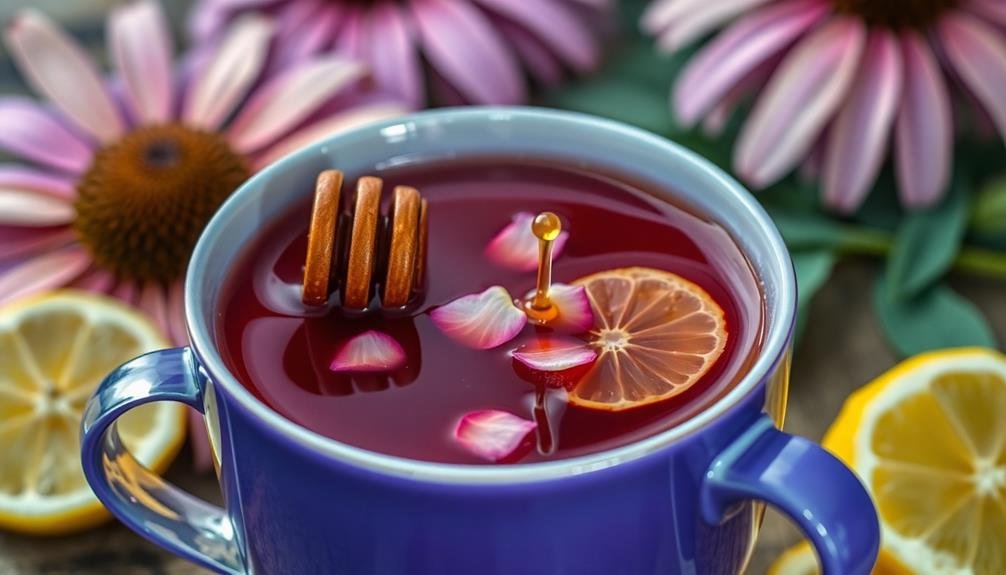
As winter approaches, Echinacea tea emerges as a powerful ally in your flu defense arsenal. This herbal brew, derived from the purple coneflower, has been used for centuries to boost immunity and fight off respiratory infections. Echinacea stimulates your body's production of white blood cells, which are essential for combating viruses like influenza.
To reap the benefits, steep 1-2 teaspoons of dried Echinacea root or flowers in hot water for 10-15 minutes. Drink this tea 2-3 times daily at the first sign of flu symptoms or as a preventive measure during flu season. You'll notice its slightly bitter taste, which you can soften with a touch of honey.
Echinacea tea works best when consumed regularly, but don't overdo it. Limit your intake to 10 days at a time, followed by a break. This prevents your body from developing a tolerance to its immune-boosting effects.
While generally safe, consult your doctor if you're pregnant, nursing, or have autoimmune disorders. Remember, Echinacea tea complements, but doesn't replace, other flu prevention methods like vaccination and good hygiene practices.
Ginger's Antiviral Properties
Ginger's powerful antiviral properties come from its active compounds, gingerols and shogaols.
You'll benefit from ginger's ability to protect against respiratory infections, making it an excellent ally during flu season.
Its inflammation-fighting compounds can help reduce symptoms and support your body's natural defense mechanisms.
Gingerols and Shogaols
Potency lies at the heart of ginger's antiviral properties, thanks to its key compounds: gingerols and shogaols. These bioactive components are responsible for ginger's pungent flavor and numerous health benefits. Gingerols are found in fresh ginger, while shogaols are formed when ginger is dried or cooked.
When you consume ginger tea, you're harnessing the power of these compounds to boost your immune system. They work by inhibiting viral replication and reducing inflammation in your body. Research has shown that gingerols and shogaols can effectively combat various flu strains, including H1N1 and H5N1.
| Compound | Found In | Benefits |
|---|---|---|
| Gingerols | Fresh ginger | Antiviral, anti-inflammatory |
| Shogaols | Dried/cooked ginger | Potent antioxidant, immune-boosting |
| 6-gingerol | Both forms | Strongest antiviral effect |
To maximize the benefits of these compounds, steep fresh ginger slices in hot water for at least 10 minutes. You can also add dried ginger powder to your tea for an extra boost. Remember, the stronger the brew, the more gingerols and shogaols you'll consume, enhancing your body's defense against flu viruses.
Respiratory Infection Protection
The respiratory system is a prime target for flu viruses, making ginger's antiviral properties particularly valuable. When you consume ginger tea, you're ingesting compounds that can help protect your respiratory tract from viral infections.
Ginger's active components, including gingerols and shogaols, have been shown to inhibit viral replication and attachment to host cells. These compounds work by creating an inhospitable environment for viruses in your respiratory system.
They can reduce inflammation in your airways, making it harder for viruses to take hold and spread. Additionally, ginger's antiviral effects may help shorten the duration of respiratory infections if you do catch the flu.
You'll also benefit from ginger's ability to boost your overall immune response. It stimulates the production of immune cells and enhances their activity, helping your body fight off invading pathogens more effectively.
Inflammation-Fighting Compounds
Harnessing the power of inflammation-fighting compounds, ginger tea offers a potent defense against flu viruses. Ginger contains gingerols and shogaols, which are bioactive compounds that exhibit strong anti-inflammatory and antioxidant properties. These compounds help reduce inflammation in your respiratory tract, making it harder for viruses to take hold and replicate.
When you drink ginger tea, you're introducing these powerful compounds into your system. They work by inhibiting the production of pro-inflammatory cytokines, which are signaling molecules that can contribute to excessive inflammation during viral infections. By keeping inflammation in check, ginger helps your immune system function more effectively.
Moreover, ginger's antiviral properties extend beyond just fighting inflammation. Research has shown that ginger can directly inhibit viral replication, particularly in respiratory viruses like influenza. It does this by interfering with the virus's ability to attach to and enter host cells.
To maximize ginger's benefits, steep fresh ginger root in hot water for at least 10 minutes. You can add lemon and honey for extra flavor and immune-boosting properties. Drink this tea regularly during flu season to strengthen your body's natural defenses against viral infections.
Elderberry Tea Benefits
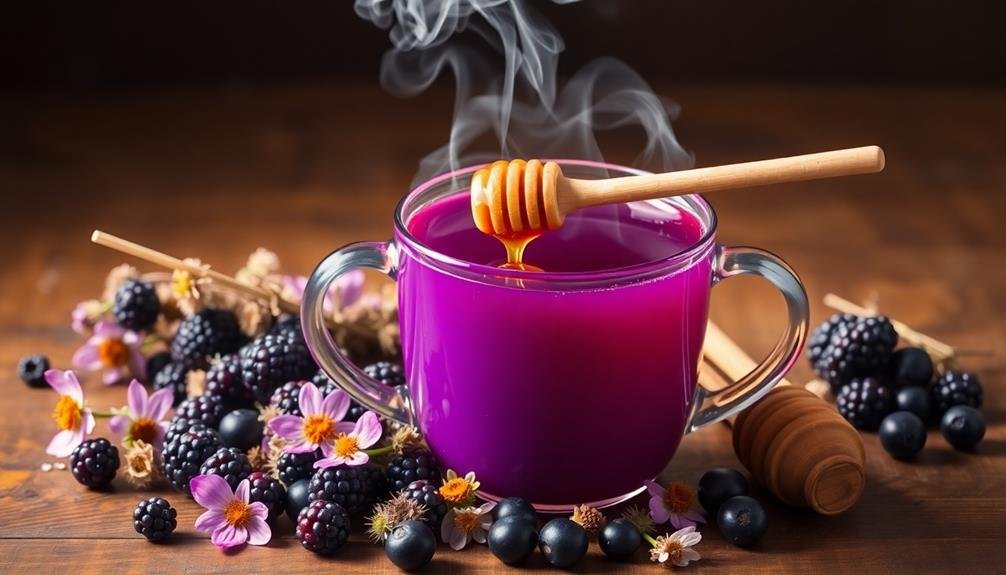
Elderberry tea offers powerful benefits for boosting your immunity against the flu.
You'll find that this herbal brew possesses strong antiviral properties, which can help combat influenza viruses.
Additionally, elderberry tea is packed with antioxidants, supporting your overall health and strengthening your body's natural defenses.
Antiviral Properties
For centuries, people have turned to elderberry tea for its potent antiviral properties. This natural remedy has gained scientific attention for its ability to fight various strains of influenza. Research suggests that elderberry extract can inhibit the virus's ability to replicate, potentially shortening the duration and severity of flu symptoms.
When you're looking to boost your immunity against the flu, elderberry tea offers several benefits:
- It's rich in flavonoids and anthocyanins, powerful antioxidants that support your immune system.
- Elderberry compounds can bind to virus particles, preventing them from entering and infecting healthy cells.
- The tea may reduce inflammation in your body, helping to alleviate flu symptoms.
- It's a natural source of vitamin C, further enhancing your immune response.
You'll find that elderberry tea is most effective when consumed at the first signs of illness. Regular consumption during flu season may help prevent infection altogether.
While it's not a substitute for medical treatment, incorporating elderberry tea into your wellness routine can provide an extra layer of defense against the flu virus.
Always consult your healthcare provider before using herbal remedies, especially if you have existing health conditions or are taking medications.
Rich in Antioxidants
Beyond its antiviral properties, elderberry tea packs a powerful punch of antioxidants that further bolster your immune system. These antioxidants, primarily flavonoids and anthocyanins, help protect your cells from oxidative stress and free radical damage. By neutralizing harmful molecules, they reduce inflammation and support overall health.
When you drink elderberry tea, you're consuming a rich source of vitamin C, which is known for its immune-boosting properties. This essential nutrient aids in the production and function of white blood cells, your body's first line of defense against pathogens.
Additionally, elderberry tea contains vitamin A, another vital component for maintaining a strong immune system.
The antioxidants in elderberry tea don't just fight off flu viruses; they also help strengthen your body's natural defenses. Regular consumption may improve your ability to ward off various infections and diseases.
Furthermore, these powerful compounds have been linked to better heart health, reduced risk of chronic diseases, and improved cognitive function.
Green Tea's Immune-Boosting Power
Packed with potent antioxidants, green tea stands out as a powerful immune booster in the world of herbal teas. Its primary compound, epigallocatechin gallate (EGCG), is known for its ability to enhance your body's defense mechanisms. When you drink green tea regularly, you're providing your immune system with the tools it needs to fight off flu-causing viruses more effectively.
Green tea's immune-boosting properties don't stop there. It's also rich in L-theanine, an amino acid that supports the production of T-cells, your body's frontline defenders against infections.
Additionally, the polyphenols in green tea have been shown to have anti-inflammatory effects, which can help reduce the severity of flu symptoms if you do get sick.
To maximize green tea's immune-boosting power:
- Drink 2-3 cups daily
- Opt for loose-leaf tea over tea bags
- Steep for 3-5 minutes in water just below boiling
- Add a squeeze of lemon to enhance antioxidant absorption
Licorice Root Tea Advantages
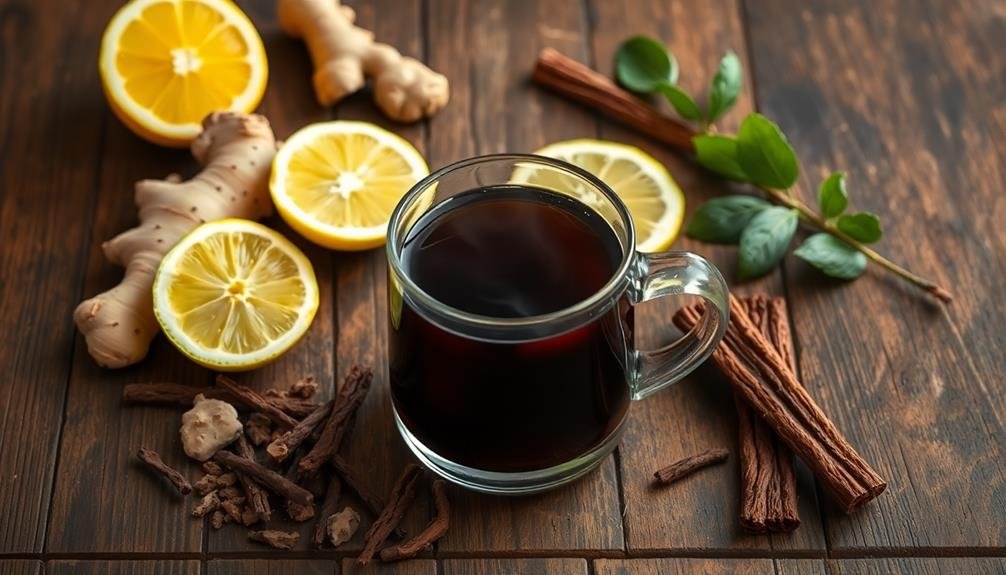
Licorice root tea steps up as another potent herbal ally in the fight against flu. This ancient remedy has been used for centuries to combat various ailments, including respiratory infections. Licorice root contains glycyrrhizin, a compound with powerful antiviral properties that can help your body fend off flu viruses.
When you drink licorice root tea, you're not only boosting your immune system but also soothing your throat and easing coughs. It's particularly effective against dry, irritating coughs that often accompany the flu. The tea's anti-inflammatory properties can help reduce swelling in your respiratory tract, making breathing easier when you're congested.
Licorice root tea also supports your adrenal glands, which play a vital role in managing stress and maintaining overall health. By reducing stress, you're indirectly strengthening your immune system.
However, be cautious with your intake. While licorice root tea offers numerous benefits, excessive consumption can lead to side effects like increased blood pressure. It's best to limit your intake to one or two cups a day and avoid it if you have certain medical conditions or are pregnant.
Peppermint Tea for Respiratory Health
A invigorating cup of peppermint tea can work wonders for your respiratory health during flu season. This aromatic herb contains menthol, a natural decongestant that helps clear your airways and ease breathing difficulties.
Peppermint's antiviral and antibacterial properties also support your immune system in fighting off flu-causing pathogens.
When you're battling the flu, peppermint tea offers several benefits:
- Soothes sore throats and reduces coughing
- Relieves nasal congestion and sinus pressure
- Promotes relaxation and reduces stress
- Improves overall respiratory function
To maximize peppermint tea's effectiveness, steep fresh or dried leaves in hot water for 5-7 minutes. You can enhance its flavor and health benefits by adding a slice of lemon or a teaspoon of honey. Drink 2-3 cups daily when you're feeling under the weather.
While peppermint tea is generally safe, it may interact with certain medications or cause heartburn in some individuals.
If you have any concerns, consult your healthcare provider before incorporating it into your flu-fighting routine. By embracing the power of peppermint tea, you'll be better equipped to combat respiratory symptoms and support your body's natural defenses against the flu.
Turmeric Tea's Anti-Inflammatory Effects

With its vibrant golden hue and earthy aroma, turmeric tea offers powerful anti-inflammatory effects that can bolster your immune system during flu season. The key compound in turmeric, curcumin, is responsible for its potent anti-inflammatory properties. When you drink turmeric tea, you're introducing this beneficial compound into your system, which helps reduce inflammation throughout your body.
Inflammation is a natural immune response, but when it becomes chronic, it can weaken your defenses against viruses like the flu. Turmeric tea helps combat this by suppressing inflammatory molecules and enzymes. It also enhances the activity of your body's antioxidant enzymes, further protecting you from oxidative stress and potential infections.
To maximize turmeric's benefits, add a pinch of black pepper to your tea. Piperine, a compound in black pepper, greatly increases curcumin absorption.
For an extra immune boost, consider adding ginger or lemon to your turmeric tea. These ingredients complement turmeric's effects and provide additional antiviral properties.
Aim to drink a cup of turmeric tea daily during flu season to support your immune system and reduce your risk of falling ill.
Lemon Balm Tea for Immunity
While turmeric tea offers potent anti-inflammatory benefits, lemon balm tea provides a different set of immune-boosting properties. This aromatic herb, also known as Melissa officinalis, has been used for centuries to support overall health and well-being.
When it comes to fighting the flu, lemon balm tea can be a valuable addition to your natural defense arsenal.
Lemon balm contains compounds that have antiviral properties, making it particularly effective against influenza viruses. It's also rich in antioxidants, which help strengthen your immune system by neutralizing harmful free radicals.
Here's how lemon balm tea can boost your immunity:
- Reduces stress and anxiety, which can weaken your immune system
- Improves sleep quality, allowing your body to better fight off infections
- Enhances mood and cognitive function, promoting overall well-being
- Supports digestive health, which is closely linked to immune function
To make lemon balm tea, steep 1-2 teaspoons of dried lemon balm leaves in hot water for 5-10 minutes. You can drink it hot or cold, and add honey for extra flavor and immune-boosting benefits.
For the best results, incorporate lemon balm tea into your daily routine during flu season.
Frequently Asked Questions
Can Herbal Teas Replace Flu Vaccines?
No, herbal teas can't replace flu vaccines. While they may offer some health benefits, they aren't scientifically proven to prevent the flu. You should rely on vaccines for effective protection against influenza viruses. Don't skip your flu shot.
How Often Should I Drink Immune-Boosting Teas for Maximum Effectiveness?
You should aim to drink immune-boosting teas daily for maximum effectiveness. Try having 2-3 cups throughout the day, especially during flu season. Don't overdo it though; moderation is key. Consistency matters more than quantity.
Are There Any Side Effects of Consuming These Teas Regularly?
While generally safe, excessive consumption of immune-boosting teas can cause side effects. You might experience digestive issues, headaches, or sleep disturbances. Some herbs can interact with medications, so it's best to consult your doctor before regular use.
Can Children Safely Drink These Immune-Boosting Herbal Teas?
You should be cautious when giving herbal teas to children. Some are safe, but others may not be suitable. It's best to consult your pediatrician before introducing any herbal teas into your child's diet.
How Long Do the Immune-Boosting Effects of Herbal Teas Last?
You'll typically experience immune-boosting effects for a few hours after drinking herbal tea. However, regular consumption can provide longer-lasting benefits. It's best to incorporate these teas into your daily routine for ideal immune support.
In Summary
You've now discovered a variety of herbal teas that can help boost your immunity against the flu. From echinacea to turmeric, these natural remedies offer unique benefits. Remember, while these teas can support your immune system, they're not a substitute for medical care. Incorporate them into your daily routine, stay hydrated, and maintain a healthy lifestyle. If you're feeling under the weather, don't hesitate to consult your doctor for proper treatment and advice.

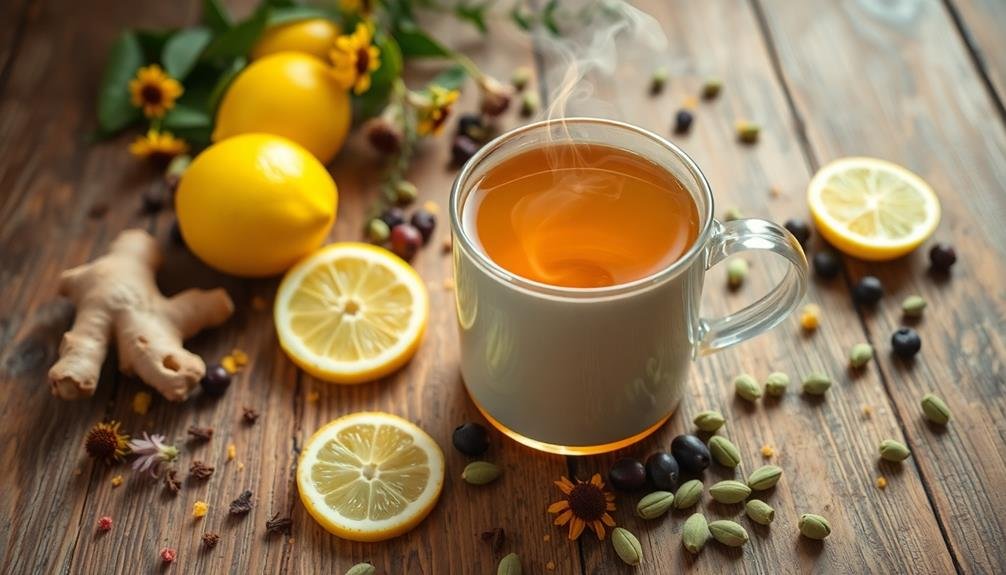


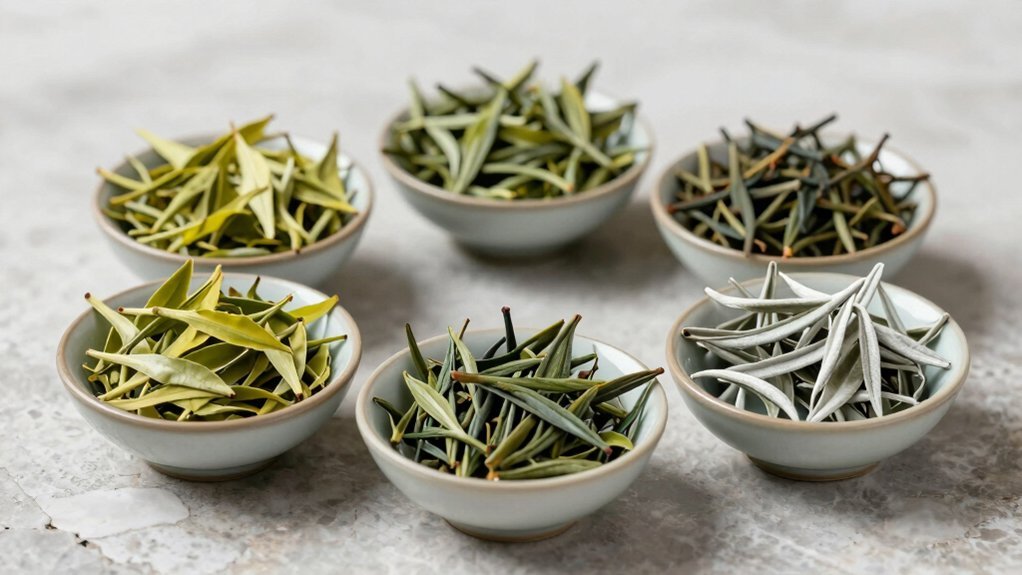
Leave a Reply